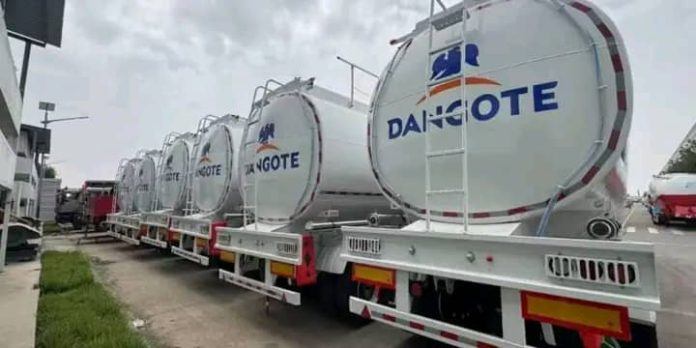The Dangote Petroleum Refinery has commenced direct and free shipping of fuel products to retailers aimed at easing distribution hitches and stabilizing pump prices across Nigeria.
The shipment which kickstart on Monday is supported by the refinery’s Compressed Natural Gas (CNG)-powered trucks, signaling a new era in Nigeria’s fuel distribution landscape.
READ ALSO, Kogi East Stakeholders Pass Votes of Confidence on Tinubu, Ododo
As part of the initiative, the refinery also announced a significant reduction in the pump price of Premium Motor Spirit (PMS), with a new benchmark price set at N820 per liter. In Lagos and the South-West, fuel will retail at N841 per liter, while Abuja, Edo, Kwara, Rivers, and Delta States will sell at N851 per liter.
The direct distribution scheme, which has deployed over 1,000 CNG-powered trucks in its first phase, is expected to benefit more than 42 million micro, small, and medium enterprises (MSMEs) by lowering energy costs and improving profit margins.
The Independent Petroleum Marketers Association of Nigeria (IPMAN) has welcomed the development, encouraging members to register for the free fuel delivery program. According to IPMAN’s National President, Abubakar Shettima, many independent marketers have already applied for direct deliveries to their retail outlets.
News Hour Video; FG ASSURES OF TIMELY COMPLETION OF ROAD PROJECT IN KOGI
However, the initiative has also drawn criticism from some stakeholders. The Nigeria Union of Petroleum and Natural Gas Workers (NUPENG) described the move as a “Greek gift,” citing alleged anti-labour practices by the company.
Similarly, the Depot and Petroleum Products Marketers Association of Nigeria (DAPPMAN) raised concerns about the long-term sustainability of the free delivery cost model.
Despite the concerns, the refinery estimates that the initiative could save Nigeria N1.7 trillion annually in fuel distribution costs and revitalize dormant filling stations across the country. By reducing fuel costs, the company aims to lower production costs for industries, ease inflationary pressures, and spur economic growth.
The refinery has also announced plans to scale up the program nationwide, with over 4,000 CNG-powered trucks expected to be deployed before the end of the year.
As operations expand, Nigerians are expected to benefit from improved fuel availability and affordability, marking a significant step toward the country’s energy independence.




